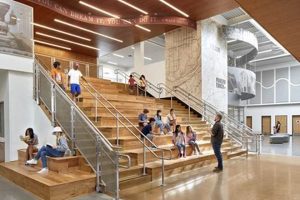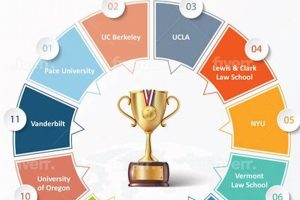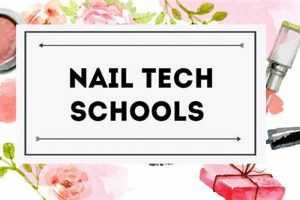Institutions known for strong exploratory programs offer students the flexibility to sample various academic disciplines before committing to a specific field of study. These programs frequently feature robust advising services, diverse introductory courses, and opportunities for experiential learning, allowing undergraduates to discover their passions and aptitudes. For example, some universities provide “meta-majors,” clusters of related subjects, which offer a structured yet open pathway for exploration.
Such an approach to undergraduate education is increasingly valuable in a rapidly evolving job market. It enables students to develop a broad knowledge base and transferable skills, preparing them for a range of career options. Historically, higher education often emphasized early specialization. However, the growing complexity of the professional landscape has highlighted the advantage of adaptable, multi-faceted individuals, fostering the development of academic structures that support exploration and informed decision-making.
The following sections will delve into specific factors to consider when selecting an institution with a strong focus on academic exploration, including advising resources, curricular flexibility, experiential learning opportunities, and career support services. Further exploration of institutional approaches, such as meta-majors and open curricula, will provide prospective students with a comprehensive understanding of the available options.
Tips for Choosing a University Offering Exploratory Programs
Selecting a university that caters to undecided students requires careful consideration of several key factors. These institutions offer distinct advantages for those still discovering their academic passions.
Tip 1: Research Advising Programs: Investigate institutions with dedicated advising programs specifically designed for undecided students. These programs should provide personalized guidance and support throughout the exploration process.
Tip 2: Explore Curricular Flexibility: Look for institutions with open curricula or a wide range of introductory courses across various disciplines. This flexibility allows students to sample diverse subjects before declaring a major.
Tip 3: Seek Experiential Learning Opportunities: Institutions offering internships, research opportunities, and community engagement programs provide valuable real-world experience that can inform academic choices.
Tip 4: Investigate Career Services: Strong career services departments can assist undecided students in exploring career paths aligned with their evolving interests and skills.
Tip 5: Consider “Meta-Majors”: Some universities offer “meta-majors,” which are clusters of related disciplines. This structure provides a framework for exploration while narrowing down options.
Tip 6: Evaluate Campus Culture: A supportive and inclusive campus environment can foster a sense of belonging and encourage exploration. Look for institutions that prioritize student well-being and offer diverse extracurricular activities.
Tip 7: Visit Campuses and Attend Events: Whenever possible, visit campuses and attend virtual or in-person events specifically designed for undecided students. This direct interaction provides invaluable insight into the institutional environment.
By considering these factors, prospective students can identify institutions that provide the necessary resources and support to facilitate a successful and fulfilling exploration of academic and career pathways.
Ultimately, the goal is to find an institution that empowers students to make informed decisions about their academic future, leading to a rewarding and impactful career.
1. Exploratory Programs
Exploratory programs represent a crucial component of institutions recognized for supporting undecided students. These programs provide structured pathways for students to discover their academic interests before committing to a specific major. They offer a framework for navigating the complexities of higher education while fostering self-discovery and informed decision-making.
- Structured Exploration:
Rather than leaving students entirely to their own devices, exploratory programs offer structured guidance. This may involve curated course clusters, designated advisors specializing in academic exploration, and workshops focused on self-assessment and career exploration. For example, some programs utilize assessments that align student interests and aptitudes with potential fields of study.
- Diverse Course Sampling:
A hallmark of effective exploratory programs is the opportunity to sample courses across a range of disciplines. This allows students to gain firsthand experience in different fields, from humanities and social sciences to STEM and the arts. This exposure is critical for discerning genuine interest from superficial assumptions. For instance, a student considering a pre-med track might explore introductory biology and chemistry courses, while also sampling courses in psychology or sociology to broaden their perspective.
- Personalized Advising:
Dedicated academic advisors play a vital role in guiding students through the exploration process. These advisors possess expertise in various academic fields and can provide personalized recommendations based on individual student interests, skills, and goals. They can also help students connect their academic explorations with potential career paths. This personalized support system is essential for navigating the often-overwhelming array of academic options.
- Integration of Experiential Learning:
Leading exploratory programs often incorporate opportunities for experiential learning, such as internships, research projects, and community engagement. These experiences provide real-world context for academic studies, allowing students to apply their knowledge and skills in practical settings. This can be instrumental in solidifying or shifting academic interests. For example, an internship in a marketing firm might confirm a student’s interest in business, while research experience in a lab could spark a passion for scientific inquiry.
These facets of exploratory programs contribute significantly to the overall success of students in identifying a major that aligns with their passions and aptitudes. By providing structure, facilitating diverse experiences, and offering personalized guidance, these programs empower students to navigate the complexities of higher education and make informed decisions about their academic and professional futures. Institutions with robust exploratory programs, therefore, stand out as ideal environments for students embarking on their academic journey with an undecided major.
2. Robust Advising
Robust advising constitutes a cornerstone of institutions effectively serving undecided students. The uncertainty inherent in choosing an academic path necessitates comprehensive and individualized guidance. Robust advising programs offer precisely this support, playing a crucial role in transforming uncertainty into informed decision-making. These programs contribute significantly to an institution’s ability to facilitate successful academic exploration. For example, a dedicated advising track specifically for undecided students might offer specialized workshops on exploring academic interests, connecting majors to career paths, and understanding general education requirements. This specialized approach allows advisors to develop expertise in guiding students through the exploration process.
The impact of robust advising manifests in several key ways. Firstly, it enables personalized exploration. Advisors work closely with students to understand their individual interests, skills, and aspirations. This personalized approach ensures that exploration is not a random process, but a guided journey of self-discovery. Secondly, robust advising bridges the gap between academic exploration and career planning. Advisors can help students understand the potential career trajectories associated with different majors, enabling them to make informed decisions aligning with their long-term goals. For instance, an advisor might introduce a student interested in social justice to various career paths, such as social work, law, or public policy, and then connect those career paths to relevant academic disciplines. Finally, robust advising fosters a sense of support and belonging. Navigating the complexities of higher education can be daunting, particularly for undecided students. A strong advising system provides a critical support network, ensuring students feel heard, understood, and empowered to make the best choices for their individual needs. This support can significantly impact student retention and overall academic success.
In summary, the connection between robust advising and effective support for undecided students is undeniable. Institutions recognized for excellence in serving this population prioritize and invest in comprehensive advising programs. These programs provide the personalized guidance, career exploration support, and sense of belonging essential for navigating the often-overwhelming landscape of higher education. By empowering students to make informed decisions, robust advising programs ultimately contribute to increased student satisfaction, retention, and successful academic outcomes. Institutions lacking such programs often struggle to provide the necessary support for undecided students, potentially leading to higher rates of major switching, delayed graduation, and overall dissatisfaction with the college experience. Therefore, prioritizing robust advising is not merely a beneficial practice; it is a critical investment in the success of undecided students and the overall quality of the institution.
3. Diverse Curricula
A diverse curriculum is a hallmark of institutions effectively serving students exploring academic options. Breadth of offerings allows for informed decision-making, aligning individual interests with potential fields of study. Exposure to a variety of disciplines is crucial for students who have not yet committed to a specific major. A rich and varied curriculum fosters intellectual curiosity and provides a foundation for informed academic choices.
- Interdisciplinary Connections:
Institutions with diverse curricula often emphasize interdisciplinary connections, demonstrating how different fields of study intersect and inform one another. This approach encourages students to think critically and make connections across disciplines, fostering a more holistic understanding of knowledge. For example, a student exploring both history and environmental science might discover the interdisciplinary field of environmental history. This exposure can lead to a more nuanced and informed decision about a potential major.
- Flexibility and Choice:
Diverse curricula provide students with the flexibility to explore a wide range of subjects before declaring a major. This freedom of choice is essential for undecided students, enabling them to sample courses across various disciplines. For instance, a student unsure about pursuing STEM or humanities can explore introductory courses in both areas, gaining valuable insights before committing to a specific path. This flexibility allows for informed decisions based on firsthand experience.
- Emerging Fields and Specializations:
A diverse curriculum often includes emerging fields and specialized areas of study, providing students with exposure to cutting-edge research and innovative areas of inquiry. This exposure can spark unexpected interests and open up new possibilities for academic and professional pursuits. For example, exposure to data science or bioengineering might inspire a student to consider these fields, even if they were not initially on their radar. This forward-thinking approach ensures that students are prepared for a rapidly evolving job market.
- Integration of Liberal Arts and Professional Programs:
Many institutions with diverse curricula effectively integrate liberal arts education with professional programs. This approach equips students with a broad base of knowledge and transferable skills, enhancing their adaptability and preparing them for a range of career options. For example, a student interested in engineering might also take courses in communication and ethics, developing valuable skills that complement their technical expertise. This combination prepares students for success in diverse professional settings.
The diversity of a curriculum directly impacts the quality of experience for undecided students. By providing opportunities for exploration, interdisciplinary learning, and exposure to emerging fields, diverse curricula empower students to make informed choices about their academic futures. Institutions prioritizing curricular breadth ultimately cultivate an environment where students can discover their passions, develop essential skills, and prepare for fulfilling careers. This, in turn, enhances their ability to attract and retain students, particularly those who are still exploring their academic and professional options.
4. Experiential Learning
Experiential learning plays a crucial role in institutions recognized for supporting undecided students. By providing opportunities to apply knowledge and skills in real-world settings, experiential learning bridges the gap between academic theory and practical application. This connection is particularly valuable for students exploring potential majors, allowing them to gain firsthand insights into various fields and make more informed decisions about their academic and professional futures. Institutions that prioritize experiential learning provide a significant advantage for undecided students navigating the complexities of higher education.
- Internships:
Internships offer structured opportunities to gain professional experience in a specific field. For an undecided student, internships can serve as a “test drive” for potential career paths. For example, a student considering a career in journalism could intern at a local newspaper, gaining practical experience in writing, editing, and reporting. This firsthand experience can either solidify their interest in journalism or prompt exploration of other fields. The ability to gain practical experience before committing to a major is invaluable for undecided students.
- Research Opportunities:
Participating in research projects allows students to contribute to the creation of new knowledge while developing critical thinking and problem-solving skills. For undecided students, research experiences can expose them to different academic disciplines and research methodologies. A student interested in STEM fields, for example, might participate in a biology research project, gaining valuable lab experience and clarifying their interest in pursuing scientific research. Such experiences can be pivotal in shaping academic and career trajectories.
- Community Engagement:
Community engagement projects offer students the chance to apply their skills and knowledge to address real-world challenges in their local communities. These experiences can expose undecided students to a wide range of social issues and potential career paths in non-profit organizations, government agencies, or social enterprises. For instance, a student interested in social work could volunteer at a local homeless shelter, gaining firsthand experience in working with vulnerable populations. This experience can be instrumental in confirming their interest in social work or related fields.
- Field Studies and Study Abroad:
Field studies and study abroad programs provide immersive experiences that broaden perspectives and expose students to different cultures and learning environments. These opportunities can be especially beneficial for undecided students, allowing them to explore new interests and gain a deeper understanding of global issues. A student interested in international relations, for example, could participate in a study abroad program focused on global politics, gaining valuable firsthand experience and clarifying their interest in international affairs. Such experiences can significantly influence academic and career decisions.
These diverse forms of experiential learning contribute significantly to a supportive environment for undecided students. By providing opportunities to explore various fields, gain practical skills, and connect academic learning to real-world applications, institutions that prioritize experiential learning empower students to make more informed decisions about their academic and professional futures. The ability to “test drive” potential career paths through internships, research, community engagement, and immersive programs allows undecided students to navigate the complexities of higher education with greater confidence and purpose. Ultimately, these experiences are instrumental in shaping not only academic choices, but also long-term career trajectories.
5. Career Guidance
Robust career guidance services are integral to institutions effectively serving students exploring academic paths. The uncertainty surrounding major selection often intertwines with career aspirations. Effective career guidance programs address this intersection, providing essential resources and support for undecided students. These services empower students to connect academic interests with potential career paths, facilitating informed decision-making and fostering a sense of purpose. For example, a university’s career center might offer specialized workshops for undecided students, focusing on self-assessment, career exploration, and connecting academic majors to various professions. Such targeted interventions can significantly influence a student’s academic trajectory.
The impact of comprehensive career guidance extends beyond simply matching interests to occupations. It facilitates a deeper understanding of the professional landscape. Career counselors can provide insights into industry trends, required skill sets, and potential career trajectories within different fields. This knowledge equips students to make informed choices aligned with their long-term goals. For instance, a student interested in the healthcare field might benefit from career counseling that explores various roles within the industry, such as physician, nurse, pharmacist, or physical therapist, and the specific academic requirements for each path. This nuanced understanding empowers students to make choices based not just on general interest, but on a realistic understanding of the profession. Furthermore, career guidance assists in developing essential job search skills. Workshops and individual counseling sessions can focus on resume and cover letter writing, interview techniques, and networking strategies. These practical skills are crucial for securing internships and ultimately, post-graduate employment. This preparation can significantly impact a student’s transition from academia to the professional world.
In summary, institutions recognized for supporting undecided students prioritize comprehensive career guidance services. These services are not merely supplemental; they are essential components of a supportive environment for academic exploration. By connecting academic pursuits with career aspirations, providing industry insights, and developing job search skills, career guidance empowers students to navigate the complexities of higher education and the professional world. The absence of such guidance can leave students feeling lost and uncertain, potentially hindering their academic progress and long-term career success. Therefore, robust career guidance services are a critical investment in the success of undecided students and a key indicator of an institution’s commitment to fostering informed and purposeful academic and career journeys.
6. Supportive Environment
A supportive environment is paramount within institutions effectively serving students navigating the complexities of major selection. The inherent uncertainty of this process necessitates a nurturing atmosphere that fosters exploration, encourages self-discovery, and provides a sense of belonging. This supportive ecosystem distinguishes institutions genuinely committed to assisting undecided students. Such an environment recognizes that choosing a major is a journey, not a destination, and provides the necessary resources and support for students to navigate this journey successfully. For instance, institutions might create dedicated learning communities specifically for undecided students, offering a built-in peer support network and fostering a sense of shared experience. These communities can be instrumental in reducing feelings of isolation and fostering a sense of belonging.
Several key components contribute to a supportive environment. Accessible and approachable advising structures are crucial. Advisors specializing in working with undecided students possess the expertise and empathy to guide students through the exploration process, offering personalized support and fostering a sense of direction. Furthermore, a culture of open dialogue and inclusivity is essential. Students should feel comfortable expressing their uncertainties and exploring various academic disciplines without fear of judgment or pressure to prematurely declare a major. This open environment encourages intellectual curiosity and allows students to discover their passions authentically. Opportunities for peer interaction and mentorship also play a significant role. Connecting with other undecided students creates a sense of community and shared experience, normalizing the exploration process and reducing feelings of isolation. Mentorship programs, pairing undecided students with upperclassmen or faculty members, can provide valuable guidance and support. Finally, access to resources such as career counseling, workshops on exploring academic interests, and events showcasing various majors contribute to a supportive environment. These resources empower students to make informed decisions about their academic futures and connect their explorations to potential career paths.
In conclusion, a supportive environment is not merely a desirable attribute; it is a fundamental requirement for institutions effectively serving undecided students. It fosters a culture of exploration, self-discovery, and informed decision-making, empowering students to navigate the complexities of higher education with confidence and purpose. Institutions that prioritize creating such an environment demonstrate a genuine commitment to student success and contribute significantly to positive academic and personal outcomes. The absence of a supportive environment can lead to increased anxiety, delayed graduation, and ultimately, dissatisfaction with the college experience. Therefore, fostering a supportive ecosystem is a critical investment in the well-being and success of undecided students and a key differentiator for institutions striving to provide a truly enriching educational experience.
Frequently Asked Questions
Navigating the complexities of higher education as an undecided student often raises important questions. This section addresses common queries regarding selecting institutions known for supporting academic exploration.
Question 1: What are the advantages of attending a university known for supporting undecided students?
These institutions offer specialized resources, including dedicated advising, exploratory programs, and diverse curricula, facilitating informed major selection. They cultivate an environment where exploration is encouraged, not stigmatized.
Question 2: How do “meta-majors” assist undecided students?
Meta-majors provide a structured framework for exploration, clustering related disciplines. This approach allows students to sample courses within a broader field of study before committing to a specific major.
Question 3: Is it disadvantageous to apply to college as an undecided student?
Many institutions welcome applications from undecided students. Expressing genuine interest in exploring academic options during the application process can demonstrate intellectual curiosity and a willingness to engage fully in the university experience.
Question 4: How can career services benefit undecided students?
Career services departments offer resources such as self-assessments, career exploration workshops, and internship opportunities. These resources help connect academic interests with potential career paths, facilitating informed decision-making.
Question 5: What is the role of academic advisors for undecided students?
Academic advisors provide personalized guidance, helping students navigate curricular options, explore various disciplines, and connect academic choices with career goals. They serve as essential mentors throughout the exploration process.
Question 6: How important is experiential learning for undecided students?
Experiential learning, such as internships and research opportunities, provides practical, real-world experience that can significantly influence major selection. These experiences allow students to “test drive” potential career paths before committing to a specific field of study.
Careful consideration of these frequently asked questions provides prospective students with valuable insights into the benefits of attending institutions renowned for supporting academic exploration. Empowered with this knowledge, students can make informed decisions aligned with their individual needs and aspirations.
The subsequent section will offer a comparative analysis of specific institutions recognized for their exemplary programs for undecided students.
Conclusion
Institutions renowned for accommodating individuals exploring academic disciplines provide a crucial bridge between the uncertainty of indecision and the clarity of a chosen field of study. This article has explored the essential components of these institutions, emphasizing the significance of robust advising, diverse curricula, experiential learning opportunities, and comprehensive career guidance. Such institutions cultivate an environment where exploration is not merely tolerated, but actively encouraged, empowering students to make informed decisions about their academic and professional futures.
The evolving landscape of higher education increasingly recognizes the value of exploration and adaptability. Institutions prioritizing the needs of undecided students are not only meeting a growing demand, but also contributing to a more informed and empowered generation of graduates. By fostering a culture of self-discovery and providing the necessary resources for informed decision-making, these institutions play a pivotal role in shaping the future of higher education and preparing students for success in a rapidly changing world. The pursuit of knowledge is a lifelong journey, and selecting an institution that embraces exploration is a significant first step on that path.







